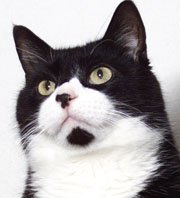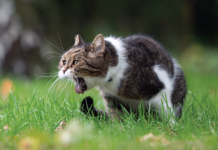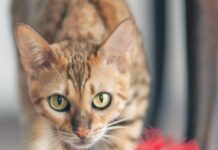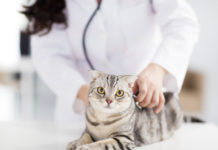Why does my cat pump her paws whenever shes near me? I keep her nails trimmed and she has never scratched or torn any of my furniture, but she pumps away. I finally have to hold her paws so I can get some rest. You should feel honored; your kitty is simply finding pleasure in your company. Actually, this kneading behavior you describe is believed to be a carryover from kittenhood. If youve had the opportunity to witness young kittens nursing, you may have noticed them doing the same kind of pumping on their mothers stomach. In this case, the paw pumping helps stimulate milk release from the mammary glands. Nursing is a pleasant experience to kittens, and many cats will continue to demonstrate this kneading behavior whenever they are pleased. I must admit, though, that a few cats are very vigorous kneaders. Ive had more than my fair share of sweaters ruined by such kitties. The best advice I can give you is to keep your cats claws trimmed, as you are now doing, or consider asking your veterinarian about applying plastic nail covers to minimize any damage the claws may be creating. And if she begins to knead too vigorously while shes on your lap, simply put her back down on the floor. ———- Much Appreciated Support By Our Readers

180
But apparently the good doctors influence stretched far beyond his fur-covered, fabric-shredded office chair. Cards from all over the country are still arriving at our office. Many whove thoughtfully sent words of encouragement related the passing of their own cats; because theyve walked that difficult road themselves, their comforting words reflect a wisdom and perspective that painful experiences alone can inform. Others sent poems, one well known to us all, but others uniquely beautiful. Some related to Mewser because he was a tuxedo cat, and their favorite kitty, too, was a wonderful “generic” feline. Cancer takes the lives of far too many cats, so understandingly, many writers identified with Mews malady. The list of the ways the writers related to Dr. Mew goes on and on. But some of you simply took the opportunity to encourage us and express appreciation for the work the Center does in behalf of cats everywhere.
This whole experience reinforces what Ive known to be true for many years: people who love cats dont just love their own cat; they love all cats. And people who love cats are deeply connected with others who love cats. We ailurophiles are bound together in a way that transcends our ages, our interests, our incomes and professions, our cultural backgrounds, our belief systems, and all our other differences. Felines are “common threads” that knit us fortunate ones together, and I believe our community is a blessed lot indeed.
Many of you sent monetary contributions to the Cornell Feline Health Center in memory of Dr. Mew, and others inquired about how to do so. The Centers Memorial Program has been in place for many years, and is a major ways the resources necessary to fulfill the Centers mission are generated. Cat lovers (and cat-loving veterinarians) wishing to memorialize their own or a friends or clients beloved cat (not just the Mewser) may do so by calling the Center at (607) 253-3414, or by visiting us at www.vet.cornell.edu/FHC/ and following the links to the Cornell Feline Health Center Memorial Program.
All of us at the Center express heartfelt appreciation to those whove offered comfort, sympathy and encouragement. Obviously the Mewser is gone from us, and so he will remain, but your kind words are comforting and encouraging beyond words.



